New York Rangers off-season playbook

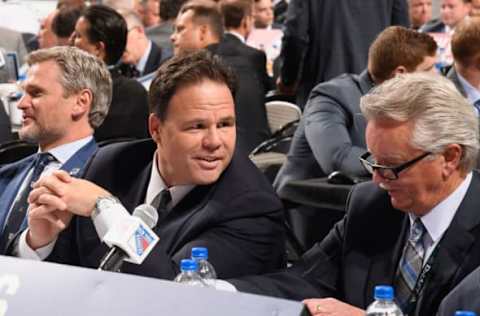
The New York Rangers will continue their rebuild this summer with the second overall pick and four others within the first 70. With salary cap flexibility and additional options to weigh it should be a very interesting summer.
In February of 2018, the New York Rangers announced that their team was going to embark upon a plan and approach to rebuild the entire franchise. While this plan began with trading up in the 2017 draft, through the acquisition of draft picks and prospects by trading veteran players, the Rangers roster has changed by 80% since the rebuild began. Barring any trades, the roster will fluctuate again in the upcoming 2019 NHL Draft with the Rangers holding five picks among the first 70 picks overall.
General Manager Jeff Gorton and his staff will add one of the world’s mercurial talents of this year’s draft in Jack Hughes or Kappo Kakko to join their growing list of top prospects. The once bare cupboard now boasts among the highest rated prospects in the league including the recently signed Vitali Kravtsov, Igor Shesterkin, Adam Fox, Tarmo Reunanen and Yegor Rykov. While the draft ranking pundits will surely address and project the potential draft picks beyond the top two, we are focusing upon the rest of the upcoming summer and the opportunities and challenges that lay ahead for the Rangers and Gorton.
While Hughes or Kakko present a no-lose proposition, it will nonetheless have an impact on the other moves that Gorton and his staff will ponder and execute over the next several months. Both players will be franchise altering picks who will change the course of the Rangers’ rebuild, and the selection of either player will be the simplest and best move the Rangers will make this off-season. Let’s begin with first things first and look at the decisions that need to be made within the current roster.
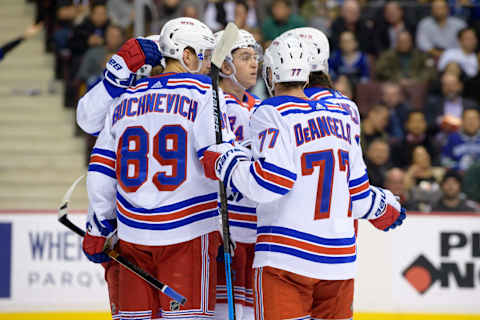
VANCOUVER, BC – MARCH 13: New York Rangers Right Wing Pavel Buchnevich (89) is congratulated after scoring a goal against the Vancouver Canucks during their NHL game at Rogers Arena on March 13, 2019 in Vancouver, British Columbia, Canada. Vancouver won 4-1. (Photo by Derek Cain/Icon Sportswire via Getty Images)
The priority restricted free agents on the roster
In looking at the restricted free agent forwards, Pavel Buchnevich, 24, is a bargain extension opportunity beyond the two-year bridge deals that we’ve seen recently that only seem to accelerate their cap impact in later years. He’ll be a top six forward and coming off a 21 goal year averaging 0.6 point per game. A two year deal is likely worth $2.9 million per year, therefore Gorton should lock Buchnevich up now for a multi-year contract of four to five years at manageable numbers $4-4.25 million per year that eats into his UFA years as much as possible. He will undoubtedly become more expensive after a bridge deal on his current trajectory that would take him within a year of unrestricted free agency.
Brendan Lemieux, 23, is an energetic and gritty forward acquired from Winnipeg in the Kevin Hayes trade. His combative play and good hands helped him become an instant fan favorite during his brief audition on Broadway. Lemieux is a needed warrior type who brings sandpaper and a protective nature to a lineup of skilled players desperately in need of a big brother. Gorton should extend Lemieux for three years at an affordable $1.8 million per year if possible.
The 2018-19 season saw Rangers Head Coach David Quinn’s rotisserie of defensemen. Neal Pionk and Tony DeAngelo are a pair of righty shooting 23-year old defensemen of comparable size and style who are both up for contract extensions. However, DeAngelo, with 30 points and a plus six clearly separated himself among the right side defenders with a strong and consistent season. As with Buchnevich, the feeling is to extend DeAngelo with a four year extension at an affordable $3-3.5 million per year if possible. Should the Rangers acquire a top pair right shot defenseman this summer that would change the length of any deal for DeAngelo.
With regard to Pionk, his play declined with the increase of ice time which puts him on the opposite trajectory in a crowded blue line which translates to a one year contract at $1.5 million. The Rangers could also go the arbitration route with Pionk and the feeling here is that if he is still here in the fall, he will be in Hartford and a spare part this upcoming season.
The others
The rest of the group of expiring contracts consists of players who are entering restricted free agency as depth players within the current Rangers roster. The feeling is these players are pure depth who have yet to prove themselves as NHL regulars. One of the objectives that Rangers President John Davidson announced is the restructuring of the Rangers minor league teams. The Rangers need to rebuild the Hartford Wolfpack roster and many of these players will be kept there or simply cut loose to make room for the pipeline coming up the system.
Fredrik Claesson, 26, was a seventh man all season. The Rangers can determine whether to extend a qualifying offer or cut ties with him. Vinni Lettieri had an uneventful nondescript season and earned a one year extension as a depth forward. Chris Bigras will likely opt for an arbitration ruling or take a two year extension at current dollars. John Gilmour is a rule six unrestricted free agent who will likely be allowed to walk if he doesn’t want to be among the Wolfpack holdovers.
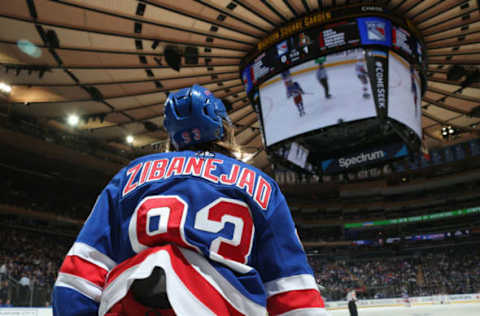
Room for improvement up front
The current group of Rangers forwards provided an offense that finished 23rd in the league in goals scored and 27th in shots per game. The power play was 17th overall and the team’s goal differential was minus 45, only six from the bottom of the entire league. Inclusive of overtime and shootouts the Rangers lost 23 games by one goal this past season. Improving 50% in one goal games puts Quinn’s team in the playoff conversation that quickly. Clearly any off-season plan needs to upgrade the offense first and foremost.
The forward group should get a huge boost from the addition of 2018 first round draft pick, Vitali Kravtsov and either of Kaapo Kakko or Jack Hughes from this year’s draft. As mentioned, the addition of either of these players will be a significant improvement. This would yield a top six forward group that would include Mika Zibanejad, Filip Chytil, Buchnevich and Chris Kreider. The key to the forward group is improving scoring production but also puck management that sustains possession in the offensive zone to take pressure off the back-end.
The bottom six forwards consist of some younger players who are continuing to develop but there are also contracts that expire next year and the Rangers would be smart to stay ahead of them. With a considerable amount of cap space there are several opportunities to accelerate the rebuild and we’ll speculate at some possible moves that help the Rangers improve the forward group with stronger, quicker more prolific scoring.
Outside of the free agent and trade market, the single biggest decision facing the Rangers is the expiration of the contract of left winger Chris Kreider after this upcoming season. Kreider, 28, will become an unrestricted free agent a year from now and management needs to determine whether the two sides can find a long term extension or evaluate other options. The former first round draft choice out of Boston College has had six productive NHL seasons averaging 22 goals and .65 points per game. The decision on Kreider cascades through the rest of the moves Gorton may make this summer.
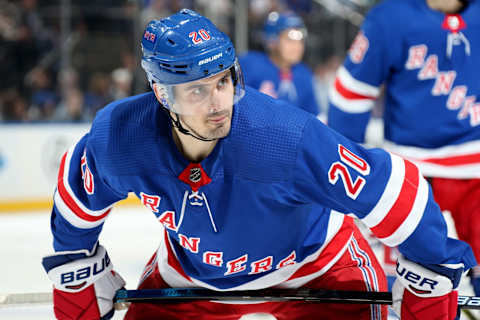
The Chris Kreider dilemma
The summer drama will need to include a decision on Kreider. I don’t see a cap scenario of signing an Artemi Panarin or other significant type contract and extending Kreider long term. It is one or the other. The decision on Kreider needs to be made before the season opens and teams undoubtedly will inquire as to what Rangers want in return during the upcoming draft. If Kreider’s camp can’t agree on an extension and are looking for a number and term outside of the Rangers realistic fit, it makes little sense to go into the season with Kreider in a walk year as was done with Mats Zuccarello and Kevin Hayes previously.
Certainly the recent extensions of Mark Stone and Jeff Skinner may relate to Kreider’s market value but does not set the bar. He signed a four year contract extension in July of 2016 with an average cap hit of $4.625 million. He has an 11 team no trade list in effect. Averaging 22 goals and less than 50 points puts his value number at $6 million for the power forward. If the open negotiation begins much higher than that it will signify the need to shop Kreider. At the low $6 million threshold I could see the Rangers keeping Kreider as a fixture within their top six.
Three teams in ‘win now mode’ regularly checked in on Kreider’s availability last season and they are in the picture of potential trade destinations for him this offseason. The Nashville Predators, Winnipeg Jets and Colorado Avalanche would appear to be among teams Kreider would accept a trade to and there could of course be others. I’ll speculate three possible trade scenarios for the Rangers involving Kreider.
Nashville – Kreider, Jimmy Vesey in exchange for 20-year old Finnish right wing prospect Eeli Tolvanen and a second or third round pick. Tolvanen is a five foot, ten inch 191 pounder with a wicked left handed release. He was the 30th player taken overall in the 2017 draft. Vesey is a productive scorer who can slot in to help Nashville’s bottom six. The trade could be expanded to include Pionk and or additional considerations.
Winnipeg – Kreider, Vesey in exchange for 20-year old Finnish prospect Kristian Vesalainen and a second or third round pick in the 2020 draft. Vesalainen is a six foot four inch 207 pound power forward with a heavy shot and net front presence. He was the 24th player taken overall in the 2017 draft. The trade parameters and pieces could be expanded to include a first round draft pick or swap of second for first should Jacob Trouba’s name surface as it it has so often the past few weeks.
Colorado – Kreider, Pionk in exchange for 19-year old Czech prospect Martin Kaut and a second or third round pick in the 2019 draft. If the Avalanche don’t want to part with Kaut, the flashy right winger who was the 16th player taken overall in 2018, 19-year old center Shane Bowers could be an asset within a package back to the Rangers. Bowers played for David Quinn at Boston University in 2017-18.
The trade could be expanded with other pieces such as Vlad Namestnikov, Vesey or Ryan Strome if there’s an opportunity and desire to pry right shot defenseman Tyson Barrie away from Colorado who’s a year away from unrestricted free agency.
These speculative trades proposed would help address a longer term approach to the Rangers need for a younger and quicker offense if the Rangers decide to move on from Kreider. If the Rangers decide to keep Kreider and extend him that would still give the team a decent top six but would also likely keep them out of any of the bigger name free agents out there this July.
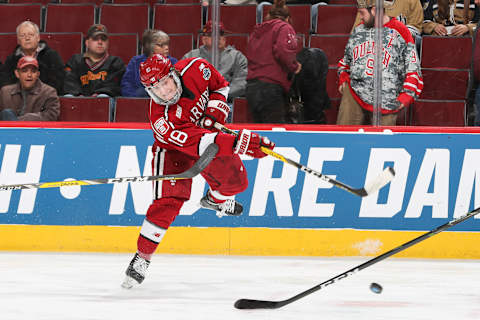
A crowded house on the back-end
The defensive side of the game is a different story and challenge. The Rangers have a logjam that needs to be addressed. While it’s possible to explore buyouts from among Marc Staal, Kevin Shattenkirk or Brendan Smith, it is a smarter business approach to hold onto Shattenkirk as a top six defensemen. Regularized Adjusted Plus-Minus (RAPM), a statistical measure of productive shifts on ice (by Evolving Hockey) are favorable for Shattenkirk and it’s clear that a more complimentary partner could boost his trade value at the deadline perhaps with the Rangers retaining some contract as a better approach.
Staal’s buyout figure doesn’t improve cap flexibility and the 32-year old carries a full no movement clause which impedes his trade value. Staal would appear to be included within the top six group at the NHL level. The defenseman without a chair is Smith who’s buyout provides some short term cap flexibility. If Gorton is unable to get Smith’s trade value up he should be bought out.
Regardless of the exact cycle out approach, the Rangers need to accelerate the turnover to open up roster space to make way for the pipeline of developing defensemen in the organization. The front runners leaving camp will include Brady Skjei, DeAngelo, Staal, Shattenkirk, Libor Hajek and Fox. Rykov, Ryan Lindgren will compete for the seventh spot with the possibility the Rangers use their blue line prospect depth to make a move for a top pair right shot defenseman.
In two years time with Shattenkirk, Smith and Staal cycled out, barring a major trade or signing of Trouba or Barrie, the Rangers will have a formidable back line consisting of Skjei, Fox, Hajek, K’Andre Miller, Nils Lundkvist, and Yegor Rykov as well as Tony DeAngelo if he is extended. Behind this rotation, the Rangers still have Reunanen, Lindgren, Joey Keane and Nico Gross in the prospect pipeline. The Rangers have many ways to go here.
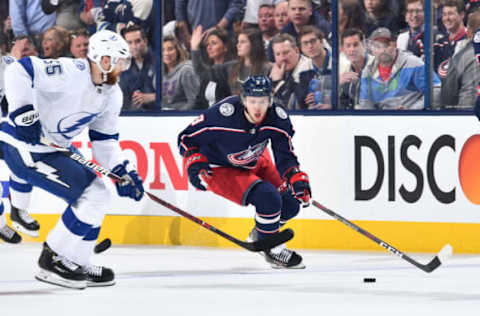
There’s little secret the Rangers will be players in the Artemi Panarin sweepstakes along with other interesting options this summer.
There are a couple of free agents who could potentially help the Rangers with accelerating their rebuild who will be available when the window opens in July. Seeing the need to improve their top six the Rangers should target an established sniper to help relieve pressure on their young offense. John Davidson intimated he’d be willing to commit all resources at his dispose toward the rebuild effort. This year’s free agent pool is only exceeded by the competition among teams vying for the opportunity to improve their outlook with the marquee players.
Number one on the list is Artemi Panarin. The scoring wizard is a player who makes everyone around him better. It is perhaps that virtue that makes him the most desirable free agent in the market this summer. New York appears to be on his list of desired destinations and his previous relationship with Davidson in Columbus could help pull him across the finish line. The Rangers could make him an $11 million dollar man and help him get settled in Brighton Beach. Adding Panarin would make the Rangers better immediately.
With Jeff Skinner already locked up by Buffalo, the next player of interest is center Matt Duchene. With Jack Hughes expected to go number one overall in the draft, the Rangers could use Duchene between a pair of their flashy wingers. Again, the competition for him will be high as will his asking price but he could fit seamlessly within the Rangers blueprint.
I don’t see a scenario whereby the Rangers retain Kreider and acquiring either of Panarin or Duchene. The numbers just don’t work and while the expansion draft isn’t the biggest risk to mitigate having the cap flexibility down the road will become critical as the Rangers will have their own version of controlling contracts in the next five years. The decision on Kreider is indeed a lynchpin of other big moves and activity.
Consolation prizes
Nonetheless there could be consolation prizes within the free agent market that help bolster the Rangers rebuilding efforts. These players could be that ‘Michael Grabner’ type acquisition who won’t be nearly as costly but who help share the responsibility of increasing the Rangers scoring to generate better results in one goal games.
The Rangers could look toward the heavy game of Carolina’s Michael Ferland or Winnipeg’s Brandon Tanev to help establish and blend a more grinding component to their overall game. Both are unrestricted free agents and could be obtained at economical cost, without tying up cap space or shedding assets. The other way to go would be to improve the situational play with the likes of Boston’s Marcus Johansson. Again, short term economical deals to bring speed, smarts, the ability to improve special teams and help close out games or perhaps the Rangers take a shot at a restricted free agent instead…
Offer sheet ? Why not
Despite the relentless speculation that this will be the summer of restricted free agent offer sheets, the hype will far outpace reality. All the big names from Mitch Marner to Matthew Tkachuk to Brayden Point will be retained. What I could see occurring is a smart deal for the right player under the optimum circumstances.
Under these ideal conditions the Rangers would trade Vlad Namestnikov to the San Jose Sharks, a team who showed a lot of interest before opting for Gustav Nyquist. An offer sheet of $4.2 million to 23-year old speedster Kasperi Kapanen that the cap strapped Toronto Maple Leafs couldn’t match would cost the Rangers a first and third round pick in 2020. Of course the Rangers would have to play Adam Fox in 30 games to trigger the conditions by which they would own their own third round pick and with the Rangers cycling out their defense corps Fox would likely suit up that many games in any event.
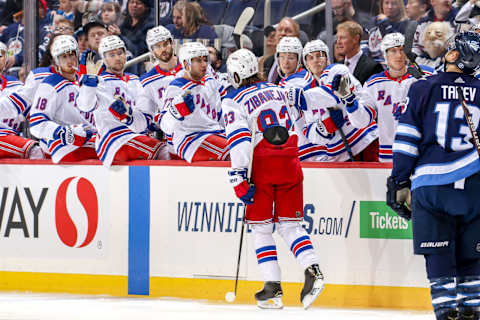
The summer of optimism
Regardless of direction, this summer will certainly be the pinnacle moment for the Rangers rebuild. With the second overall pick and four others among the top 70 overall the team will continue to stockpile prospects.
With $19 million in cap space to work with the Rangers will retain players within their long term plan as well as be in the hunt for some game changers with the free agent market.
With a budding prospect pool and staying ahead of expiring contracts they can also look to build through the trade market for younger, quicker and stronger assets. 2019 will certainly be a summer to remember. Enjoy the summer Ranger fans.
The elite draft prospects in the draft. light. Related Story